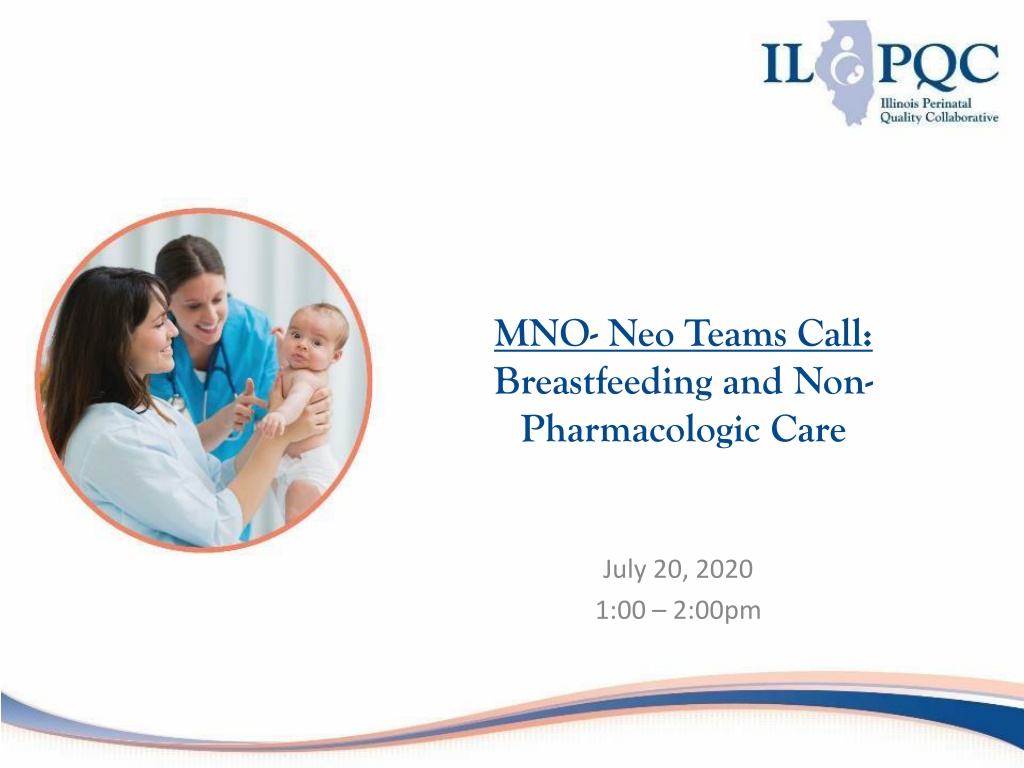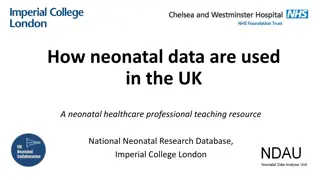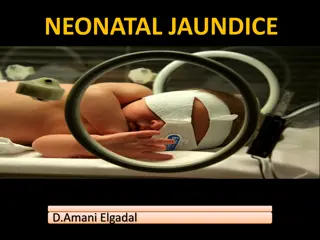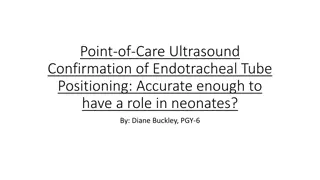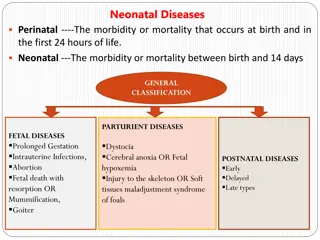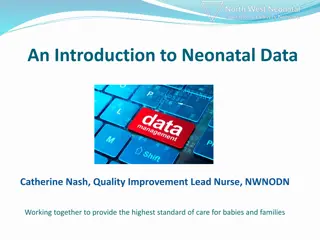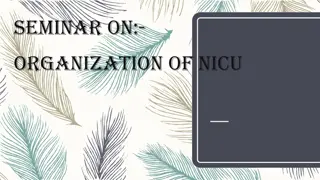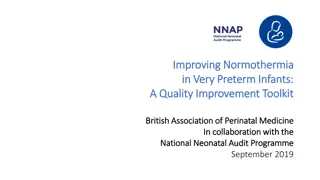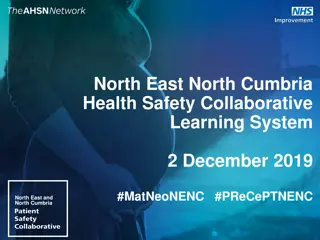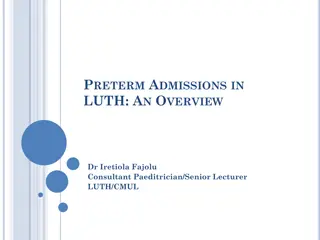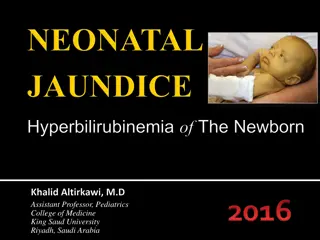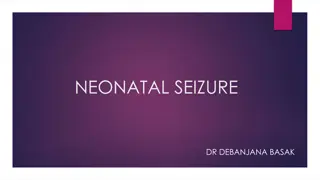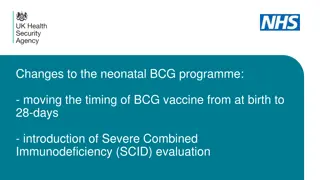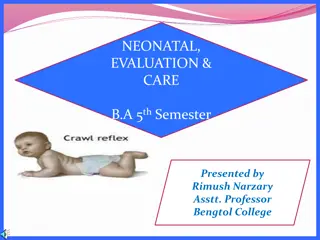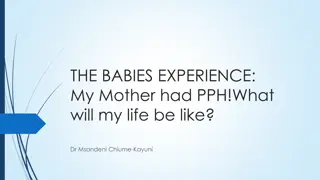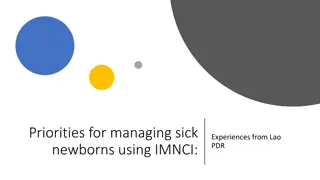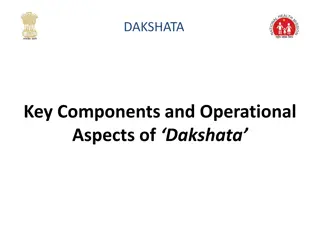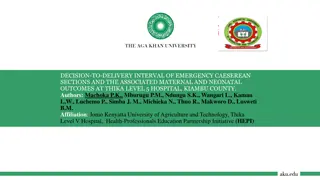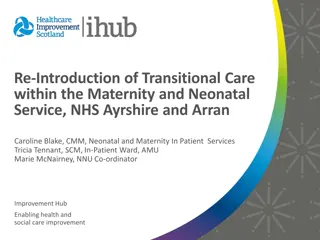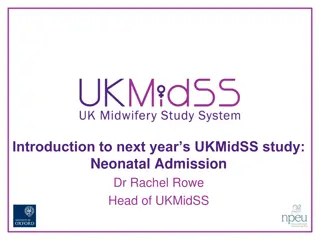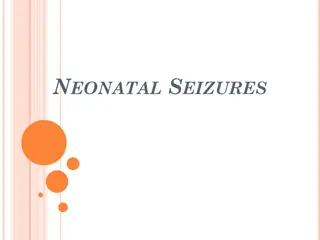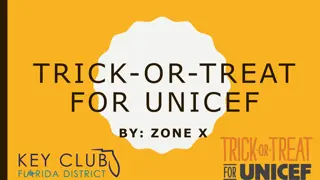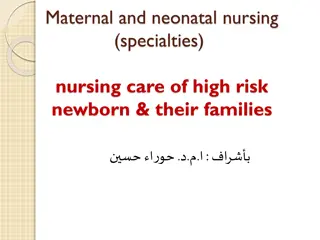Neonatal Care Initiative Meeting Highlights
Neonatal care initiative meeting highlights the focus on improving breastfeeding rates, reducing pharmacologic treatment, and enhancing discharge planning for optimal care of infants. The aim is to achieve key performance measures statewide, emphasizing the importance of non-pharmacologic care protocols and system changes to support hospital teams in meeting their goals. The meeting also discusses strategies to reach targets for breastfeeding rates, NAS symptom treatment, and coordinated discharge plans for neonates. Updates on data submission and revised Redcap questions are provided to support ongoing progress.
Download Presentation

Please find below an Image/Link to download the presentation.
The content on the website is provided AS IS for your information and personal use only. It may not be sold, licensed, or shared on other websites without obtaining consent from the author. Download presentation by click this link. If you encounter any issues during the download, it is possible that the publisher has removed the file from their server.
E N D
Presentation Transcript
MNO- Neo Teams Call: Breastfeeding and Non- Pharmacologic Care July 20, 2020 1:00 2:00pm
Call Overview MNO-Neonatal: Next steps to support hospital teams achieve the initiative goals and debrief BASIC 2020 planning updates and discussion Save the date 2
Crossing the finish line with MNO-Neonatal We must achieve the following statewide performance on key measures: OENs receiving breastmilk from eligible mothers at discharge> 70% OENs with NAS symptoms receiving pharmacologic treatment <20% OENs discharged with a coordinated discharge plan> 95% 3
Crossing the Finish Line with MNO-Neo This summer into fall we will focus on helping all hospital teams achieve key aims to cross the finish line and move into sustainability Not all teams are there yet, but these aims are achievable and we have clear strategies to achieve our goals to decrease NAS pharmacologic care as appropriate, increase breastfeeding for eligible mothers, & coordinate discharge to ensure optimal care for OENS in every hospital, for every patient, every time. 4
Making Systems Change Happen 89% 83% of teams have a non-pharm protocol in place of teams have a prenatal consult protocol in place 85% 89% of teams have a discharge protocol in place of teams have a pharm protocol in place
Received Maternal Breastmilk from Eligible Mothers at Infant Discharge % of OENs Goal 100% 90% 78% 78% 76% 76% 80% 80% 70% 78% 70% 70% 68% 68% 68% 59% 64% 58%60% 60%59%67% 53% 59% 63% 57% 60% 54% 54% 50% 40% 33% Don t forget to submit June 2020 data! 30% 20% 10% 0% AIM = 70% 6
UPDATED REDCAP Question! 7
Received Pharmacologic Treatment % of all OENs % of OENs with NAS Symptoms Goal 70% 59% 60% 52% 47% 50% 48% 44% 47% 43% 45% 42% 41% 44% 43% 42%40% 40% 37% 39% 39% 34% 29%32% 33% 33% 36% 32% 32% 32% 32% 29% 33% 33% 29% 30% 30% 29% 25% 21% 23% 21% 24% 23% 23% 19% 25% 21% 21% 17% 20% 17% 16% 16% 11% 11% 10% 0% AIM = 20% 8
Discharged with a Coordinated Plan % of OENs Goal 100% 90% 84% 80% 75% 70% 64% 67% 62% 67% 61% 58% 64% 50%52%55% 60% 55% 52%49% 49% 47% 46% 50% 40%41% 40% 51% 38% 39% 44% 40% 30% 20% 10% 0% AIM = 95% 9
Mothers engaged in Non- Pharmacologic Care % mothers engaged in non-pharmacologic care 100% 86% 90% 79% 75% 80% 75% 75% 75% 73% 73% 72% 72% 72% 69% 68% 65% 70% 65% 65% 64% 63% 62% 59% 59% 59% 58% 60% 48% 47% 50% 40% 30% 20% 10% 0% 10
Use of ESC & Modified- Finnegan for NAS Assessments ILPQC MNO-Neonatal Initiative Percent of OENs with ESC and Modified Finnegan Documented as Assessment Used for NAS Symptoms All Hospitals, 2018 - 2020 % ESC % Modified Finnegan 100% 90% 88% 80% 76% 74% 73% 70% 68% 68% 67% 65% 65% 64% 63% 62% 62% 62% 60% 58% 56% 49% 55% 51% 53% 50% 50% 48% 48% 42% 48% 47% 47% 47% 43% 40% 42% 40% 40% 39% 39% 37% 37% 35% 34% 34% 32% 31% 30% 30% 27% 27% 26% 26% 24% 24% 20% 17% 14% 10% 0% 11
Use of PRN & Standard Dosing for Pharmacologic Treatment ILPQC MNO-Neonatal Initiative How First Pharmacologic Agents were Ordered for OENs Receiving Pharmacologic Treatment ALl Hospitals, 2018 - 2020 % PRN % Standard Dosing 100% 90% 37%31%33%43% 40% 80% 43% 43% 42% 57% 58% 71%60% 70% 63% 67% 68% 72% 76%87% 60% 82% 92%85% 89% 89% 94% 50% 40% 63%69%67% 60% 30% 57% 57% 58% 57% 43% 42% 40% 20% 38% 33% 32% 29% 28% 24% 10% 18% 15% 13% 11% 11% 8% 6% 0% 12
OPTIMIZING BREASTFEEDING AND NON-PHARMACOLOGIC CARE 13
Strategies for MNO-Neo Teams Key strategy for building partnerships for ongoing care for OENs Use tools/systems of NAS care (MNO-Neo Folder, Prenatal Care team conference and Admission Huddles) to begin the process Educate staff on MNO Coordinated Discharge Checklist and Collaborative Discharge Plan included in MNO- Neo folder for early activation We must provide non- pharm care as the first line treatment for OENs and NAS care. Implement standardized protocols for care teams to engage families in optimizing non- pharmacologic Provide education to mother/families prenatally during Prenatal Care team conferences OEN Admission Team Huddles- initiated by the charge nurse to include all care team members to obtain and launch tool in the MNO-Neo Folders Partner with OB team to implement Prenatal Care team conferences NAS Clinical debrief- implement of a NAS Clinical Debrief Review Form with the clinical team NAS Assessment tool Systems for NAS Care Coordinated Discharge 14
OEN Admission Huddle What is it? A gathering of key clinical care team members at newborn admission to NICU/SCN/NBN to review the MNO folder and begin the coordinated discharge Who should be involved? Key clinical care team members Neo, Peds, Nursing, Social Work, etc. When should it occur? Called by the charge nurse or head nurse when clinical care team members Neo, Peds, Nursing, Social Work, etc. Why should we implement this strategy? Launch and review the MNO folder and begin the coordinated discharge 15
Systems for Optimal OEN Care 1) MNO Folders. Initiate the MNO folder to help create a standardized system to provide the highest level of care for every OEN (including the coordinated discharge materials) to provide the highest level of care for every OEN 2) OEN Admission Huddle. Utilize an OEN Admission Huddle with the care team (Neo, Peds, Nursing, Social Work, etc.) at newborn admission to NICU/SCN/NBN to review the MNO folder and begin the coordinated discharge 3) MNO-Neonatal Education Campaign. Implement standardized education for providers and nurses on key elements of the MNO-Neonatal initiative, including the importance of engaging families in non-pharmacologic care and coordinated discharge planning. 4) Non-Pharmacologic Care. Implement standardized protocols for care teams to engage families in optimizing non-pharmacologic care as the first line of treatment for OENs 5) Coordinated Discharge. Include the MNO Coordinated Discharge Checklist and Collaborative Discharge Plan in every MNO-Neonatal folder activated by the care team when the mother delivers. 16
Care Team Resources to Optimize Non-Pharm Care ILPQC Prenatal Consultation Checklist- include important information to share with mother/family about engaging in non-pharmacologic care of the newborn ILPQC Infant Bedside Checklist- tool to be used by the care team during NAS Assessments to track non-pharmacologic care being optimized by care team and family. Built in process to facilitate huddles with the family Breastfeeding Traffic Light- tool that provides guidance on supporting breastfeeding for pregnant persons with OUD, lays out contraindications in easy to understand table NAS Clinical Debrief Form- Use this form to review missed opportunities in caring for Mothers and Newborns affected by Opioids with the clinical care team. This form will facilitate review of: prenatal consult, non-pharmacologic care, breastfeeding, and coordinated discharge Should all be included in the MNO-Neo Folder! 17
Coming Soon! Join us at ILPQC and participate this August National Breastfeeding Awareness for MNO Post **NEW** ILPQC Breastfeeding Awareness Resources in your staff lounges and on your unit Share and distribute ILPQC Breastfeeding Packet that you receive in you MNO-Neo Newsletter Complete at least 1 Breastfeeding Missed Opportunity Review form to improve non-pharm care and encourage breastfeeding for eligible infants 18
NEW Breastfeeding Education Resource for Providers! Download this resource on ILPQC.org! 19
Care Team Education to Optimize Non-Pharm Care MNO-Neonatal Key Messages and Strategies Poster Mothers are the Best Treatment Option Poster Supporting Breastfeeding Poster Eat-Sleep-Console Simulation & Debrief Video Engaging Mom in Non-Pharmacologic Care Simulation & Debrief Video 20
Resources to Engage Families in Non-Pharm Care ILPQC Newborn Care Diary- tool to be used by the family to NAS Assessments to track non-pharmacologic care being optimized and partner with the care team. Built in empower the family in engaging in the care of the newborn (included in the MNO Folder!) 21
MNO-OB 2020 Timeline 2021: Fall & Winter 2020 Quarterly Sustainability check in Calls with Teams, implement sustainability plans Summer 2020: Work to implement sustainability plan, ILPQC 1:1 QI Support for hospitals All teams work to cross the finish line, and start sustainability plan
Upcoming MNO-Neonatal Teams Calls Date Topic July 2020 Breastfeeding & Non-Pharmacologic Care August 2020 Optimizing non-pharmacologic care to support and reduce pharmacologic treatment of NAS symptoms September 2020 Coordinated Discharge begins at newborn admission to NICU/SCN/NBN October 2020 Canceled- 2020 Annual Conference 23
MNO-NEONATAL DISCUSSION/ROUND ROBIN 24
MNO-Neo Discussion/ Round Robin What strategies are your hospitals using optimize non-pharmacologic care? What are barriers you are facing and what can we learn from other hospitals in the collaborative or from the key strategies? 25
BABIES ANTIBIOTIC STEWARDSHIP IMPROVEMENT COLLABORATIVE (BASIC) UPDATES 26
BASIC 2020 Timeline June-July 2020: Aug-Oct 2020: November 2020: Monthly webinars begin October 29, 2020 Workgroup finalize AIMs, Measures, Data Form Wave 1 tests data collection process Statewide Launch
SAVE THE DATE! ILPQC VIRTUAL Annual Conference 2020 October 29, 2020 28
THANKS TO OUR FUNDERS
